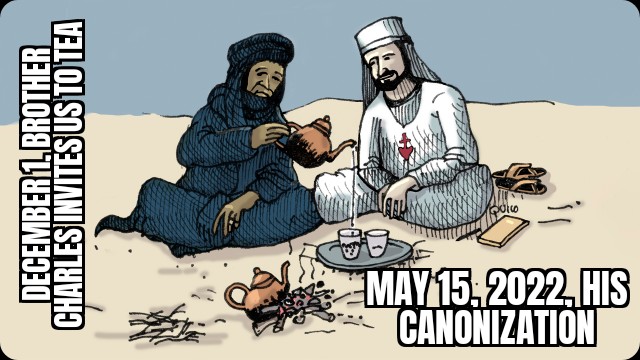Author Archives: Fraternidad Iesus Caritas
(Italiano) Piccole Sorelle di Gesù, notiziario 2021
(Español) Calendario intercultural diciembre 2021
Intensive care. Aurelio SANZ BAEZA
I’m alive, and the monotonous sound of the respirator, of the machines that control me, lets me know that my heart has not stopped. I don’t know when or how I got here. My watch stopped in my mind, and I stopped seeing time pass in that object that situates me in the moment and that, for now, I do not miss. The sounds of my house, my work, my street, the bar where I have  coffee or beer, have remained on a hard disk that I do not know if I will retrieve. The virus knocked everything out of control, and separated me from those I love. What used come to me through the media remotely about how people were in the same situation that I am now, is my reality at this moment. Like so many things in life, you think that it will never happen to you.
coffee or beer, have remained on a hard disk that I do not know if I will retrieve. The virus knocked everything out of control, and separated me from those I love. What used come to me through the media remotely about how people were in the same situation that I am now, is my reality at this moment. Like so many things in life, you think that it will never happen to you.
I realize that there are people who are taking care of me; I can’t see them clearly, and it’s like being in a spaceship, where you only see their eyes through their safety goggles and the screens that protect them from me, just like what I use at work. I am a danger, but a danger that requires their attention and, I believe, much tender care, even if they didn’t know me before. I don’t know their names, nor does their voice reach me clearly – although always without demands – and I don’t understand what they’re saying to me. I let myself be attended to. I can’t move and nor do I even wish to move a finger. Continue Reading →
(Español) Una espiritualidad para hoy. José Ignacio GONZÁLEZ FAUS
(Español) Rezar juntos y reír en común. José Antonio PAGOLA
(Español) Espiritualidad, una mirada integral. Javier MELONI
1 December, brother Charles
Be Brothers. UK and Eire. November 2021
The long-awaited announcement, from Vatican News:
“Pope Francis will canonize Blessed Charles De Foucauld, considered to be one of the pioneers of interreligious dialogue, together with six other Blesseds, during a Canonization Mass in St. Peter’s Basilica on 15th May. “The announcement was made on Tuesday 9th November by the Congregation for the Causes of Saints. It follows the Ordinary Public Consistory of 3
May 2021, whereby the Pope had authorized the canonizations, without however setting a date for the ceremony due to the health emergency caused by the Covid-19 pandemic.”
From the editor
Dearest brothers, I am most grateful for the enriching variety of material submitted for this edition of “Be Brothers uk & eire” (the second under that newly-internationalised title) but it has meant a few contributions have had to be left over for a future issue.
I particularly welcome Peter Coxe’s description of our “Month of Nazareth” in September, all Moira Potier’s assistance and, of course, the material from Ireland. However, DO keep it coming; and, as always, I appeal for local news– what you usually or unusually do in your own fraternity. Do take Michael Jones’ wonderful piece on page 14 as your inspiration!
As we finally approach the year of Brother Charles’ canonisation (yes, perhaps not what he sought, but one of those necessary things ‘pour encourager les autres?!) let us keep in our prayers the need for each of us and our whole poor world to heed his example of universal fraternity, and of learning from those who are different to us. Perhaps it will even enable us, by the grace of God, to navigate a way through the perils of global warming. God bless, Bob.
Read the issue on PDF: Be BrothersA4Nov2021



